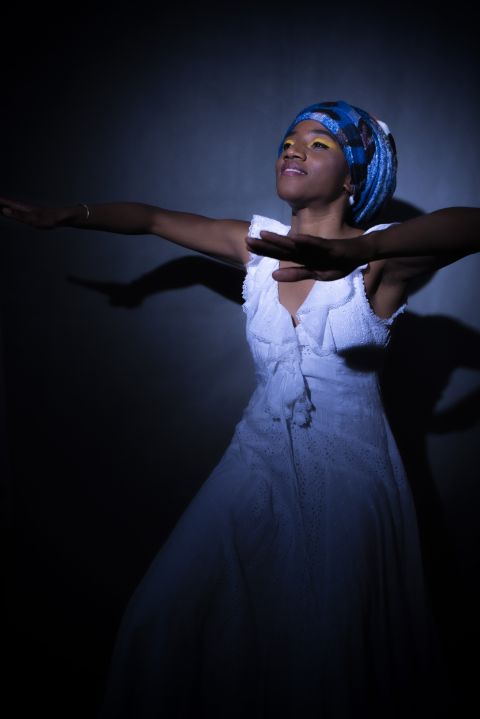Yanvalou—Ceremonial Dance of Water, an Initiation to Lakou
Laura Beaubrun (Boukman Eksperyans) and others
Movement Lecture, Dance and Singing Workshop
Sun., 3.8.2025
16:00–18:00
Angie Stardust Foyer
In English and French
Free entry

Yanvalou, Laura Beaubrun. Photo: Lauren Pasche, courtesy of artist
Through this movement lecture, dancer, choreographer, and art therapist Laura Beaubrun fosters body, voice, and community connection, introducing participants to the lakou way of life. Beaubrun’s own formative years were spent in a lakou and became central to her pedagogical and artistic practice, which in turn aims to unify humanity, the sacred, and the natural realm.
Yanvalou is a traditional Haitian ritual dance of West African origin that unified the traditions of different peoples fighting to free themselves from enslavement. Its undulating, flowing body movements, which go from head to pelvis, mimic those of ocean waves and other water elements. Primarily performed at the start of Vodou ceremonies, it embodies dynamics of healing, spiritual connection, collaboration, and respect for Haitian ancestors and cultural roots. The dance constitutes an integral component of the Rada rite, dedicated to the lwas (spirits) of that pantheon. One of these lwas is Damballa, who is typically represented as a snake living within the trees—Yanvalou is dedicated to this divinity, regarded as the primordial creator of all life, and a source of peace and tranquility. It unfolds in a fluid, circular dance where body and spirit enter into dialogue, a dynamic expression of softness and flow that gently counters rigidity.
Beaubrun’s movement lecture employs dance, percussion, and singing, along with different practices of listening, relaxation, sensing, and learning to connect with Haitian culture and spirituality. The session includes introductions to the origins and sacred meanings of both Yanvalou and the lakou.
In addition, Beaubrun is a member of the family who founded the legendary band Boukman Eksperyans and performs with them during their concert on the second day of Bwa Kayiman—Lakouzémi.